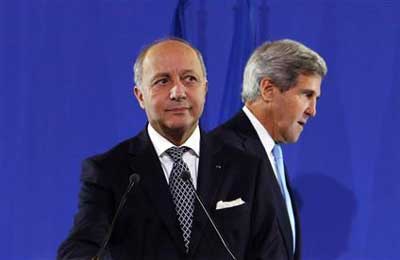
US Secretary of State John Kerry joins French Foreign Minister
Laurent Fabius at a news conference.
Too many cooks in the Iran nuclear kitchen
Tehran, November 18, 2013
By Yousaf Butt
Last weekend, after years of failed negotiations, the "P5+1" nations - the five permanent members of the United Nations Security Council (the United States, Britain, France, Russia and China) plus Germany - finally appeared to be on the verge of a deal with Iran regarding curbs on its nuclear program.
All except France were ready to sign a stopgap agreement that would offer Iran limited sanctions relief in return for a freeze in its nuclear program. But Paris torpedoed the arrangement at the last moment - denigrating it as "a sucker's deal."
France's torpedoing of the agreement appears less related to genuine nuclear proliferation concerns than with trying to curry favor with anti-Iranian countries who commission and buy expensive French military, satellite and nuclear hardware.
The lesson in this latest failure is there ought to be a single point of contact with Iran endowed with executive authority over resolving the nuclear issue.
Iran is now involved in separate discussions with both the P5+1 nations - who cannot seem to reach a consensus themselves - as well as with the International Atomic Energy Agency (IAEA).
With so many disparate dialogues, requirements and revisions now in motion, it is not surprising that the nuclear issue hasn't been resolved. There are too many cooks in the Iranian nuclear kitchen.
A hint of the difficulties within the P5+1 nations was revealed last weekend when an unnamed Western diplomat told Reuters how France scotched the imminent deal: "The Americans, the EU and the Iranians have been working intensively together for months on this proposal, and this is nothing more than an attempt by [French Foreign Minister Laurent] Fabius to insert himself into relevance late in the negotiations."
When Secretary of State John Kerry tried to paper over differences between Paris and Washington, Iranian Foreign Minister Mohammad Javad Zarif took to Twitter, asking, "Mr. Secretary, was it Iran that gutted over half of the US draft Thursday night and publicly commented against it Friday morning?"
France's reluctance to sign off on the interim agreement is easier to understand through the prism of its lucrative regional trade agreements which could be put at roughly 40 billion euros ($54 billlion).
Aside from the P5+1 dialogue, Iran is also involved in separate negotiations with the IAEA. Some genuine progress has recently been made in these talks, culminating in the release of a joint framework of cooperation between the IAEA and Iran.
One positive development is that the IAEA seems to have dropped its concern about the Parchin military base, where it previously alleged - based on undisclosed evidence from third-party intelligence agencies - that Iran may have carried out conventional explosions possibly relevant to nuclear weapons, more than a decade ago.
The IAEA's past preoccupation with accessing the Parchin military base - which is not a nuclear site - was a distraction that was only getting in the way of reaching a deal in the more important P5+1 talks.
The way these multiple sets of talks are now structured, it is possible that Iran may resolve its issues with the IAEA - but continue to be sanctioned by the world powers. Or, alternatively, the P5+1 nations may reach an agreement with Iran before the IAEA is fully satisfied.
To streamline all the talks and avoid such bizarre outcomes, it would help to have one point of contact with Iran that would assess whether or not the country is in compliance with its international legal obligations. It is obvious that any nation having large financial conflicts of interest in reaching a deal with Iran should recuse itself from these negotiations.-Reuters
(Yousaf Butt, a nuclear physicist, is the director of the Emerging Technologies Program at the Cultural Intelligence Institute. The opinions expressed are his own).







